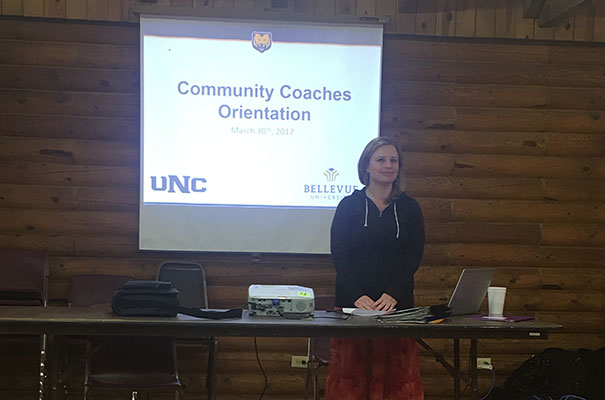UNC Researchers Develop Unique Community Safety Program for S.D. Reservation

May 2, 2017
Above: Lauren Rankin presents the Community Coaches program in March at Oglala Community College in Eagle Butte, South Dakota. She and fellow researchers met and discussed the program with the program’s mentors who will be paired with court-involved Native Americans. Photo courtesy of David Hulac
May 2, 2017 — University of Northern Colorado researchers have developed unique programming for a grant-funded project to address community safety on the Cheyenne River Reservation in Eagle Butte, South Dakota.
Assistant Professor of School Psychology David Hulac and graduate assistant Lauren Rankin are finishing the project with the South Dakota District of the Federal Probation and Pretrial Services (FPPS). They were asked to developed training manuals to help prevent crime and reintegrate those who've committed crimes.
Rankin recently presented the Community Coaches manual and provided training to mentors who will be paired with court-involved Native Americans to provide support as trusted advisors. The Community Coaches program will start this spring.
"Coaches and participants work on activities designed to help participants gain personal insight and independence on their journey to being productive community members," Rankin said. "Based on our own literature reviews and our work with South Dakota Federal Probation, it was clear that there was very little precedent for such a program. However, it was important to everyone that Native values, practices and perspectives were included in any supervision and treatment plan.
"The coaches' manual is part of a series of manuals for the program that includes group counseling, behavior management, and individual problem solving, all of which are evidence-based in their design."
Hulac and his colleagues got involved in the project based on his previous work to evaluate the effectiveness of cognitive behavioral interventions that FPPS was providing across the state.
"Due to a quirk in federal law, Native Americans are far more likely to be tried in federal court, which has harsher prison sentences," he said. "A Native American who commits a similar crime to a non-Native in South Dakota is more likely to face a longer prison sentence.
"Alternatives to incarceration are important, and so this program was designed to provide a better cognitive behavior therapy program that incorporated Native values with the intention of helping program participants understand that criminal thinking and behavior did not align with traditional Lakota values."
About the Grant
- Project Title: The Cheyenne River Program
- Grant award: $69,000, July 2016-June 2017
- Funding Agency: South Dakota District of the Federal Probation and Pretrial Services
- Researchers: UNC Assistant Professor David M. Hulac (primary investigator), UNC graduate assistant Lauren Rankin, and Irene Harper (co-primary Investigator), Bellevue University
- Of note: The mission of the project is: "To help participants overcome barriers to lawfulness and community engagement and to keep community members safe." In addition to pairing mentors with court-involved Native Americans, the program includes group counseling, behavior management, and individual problem solving, all of which are evidence-based in their design, Rankin said.

